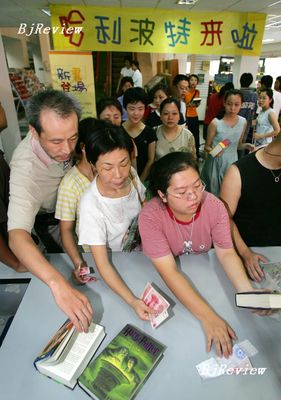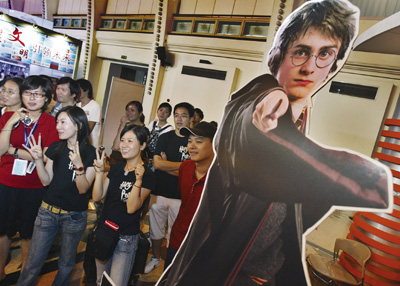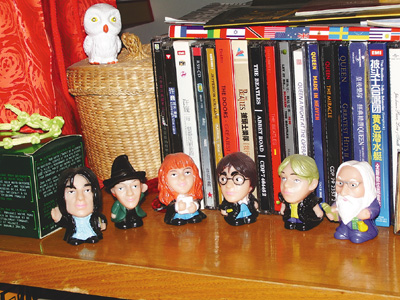| Home / Culture / Culture -- News | Tools: Save | Print | E-mail | Most Read |
| Wild About Harry |
| Adjust font size: |
Li Xiao, 18, is a Beijing girl from a middle-class family in her last year at middle school. Early June is a crazy time for Li and her classmates as they are knuckling down to prepare for the university entrance exams. But once class is over, chatter among the girls quickly strays from the hypnotic tedium of textbooks to the eagerly anticipated new Harry Potter novel. They are all aware that this is the last time their much loved young wizard will wave his magic wand in the hallowed halls of Hogwarts. "I've reserved the new Potter book's English version from a bookstore, which will be available on July 21 for his fans all over the world. I will definitely be buying the Chinese version later too. I cannot wait to read the final chapter," Li told Beijing Review. Like millions of Potter fans, Li has read the books, watched the movies, discussed the adventures with friends, visited fanclub websites and collected her boy hero's posters and souvenirs. Her Potter memorabilia is so vast that even her mom wears the scarlet and gold scarf of Gryffindor, Harry Potter's school house. It is still a month before the global launch of the English version of the final book, temporarily entitled Harry Potter and the Deathly Hallows, on July 21. Most Chinese fans have opted to pre-order copies of the English version, as it is expected that a Chinese translation may be four months down the line-and for Potter fans the wait is not an option. These readers are confident their English ability is good enough to follow the adventures and possible demise of Potter, as hinted by author J.K. Rowling. More than just a book
Ye, who is working with the department of children's book at the prestigious publishing house known as the "cradle of literature publishing of new China," told Beijing Review how the Potter books were imported and published to cater for Chinese readers. He believes these stories have even enlightened the imagination of fans about a world previously unknown to them. "Frankly speaking, we were still ignorant about the publishing business outside China in 2000 when the computer industry was primitive here and the Internet remained something unconnected with daily life in China." In those days, said Ye, there was only one computer in the publishing house with access to the Internet. "I noticed the Potter books from the articles on Bookseller and New York Times Book Review accidentally and proposed the title for consideration of our press's management." According to Ye, a number of publishing houses in China had also noticed the title in 2000, when the Potter books were gradually becoming bestsellers worldwide. While other publishing houses were pressured from senior editors to refuse the buying rights, alleging that the stories of wizards would have a negative impact on Chinese children, People's Literature Publishing House was quick off the mark and went ahead with their negotiations. "Amazingly, we did not encounter any warning, neither from our management nor from the publishing authorities," said Ye after the decision was made to publish the Chinese version. Purchasing rights was really something new for Chinese publishers at that time, as China had just joined the Berne Convention for the Protection of Literary and Artistic Works in 1995. Not knowing how to contact the copyright owner, they sought help from overseas literary agents to finally contact Bloomsbury, the British publisher of the books. After much scrutiny, the go ahead to make an offer came from Bloomsbury after two months waiting on tenterhooks.
Ye's press bought the single copyright of the version in simplified Chinese, for world distribution, of three titles-Harry Potter and the Philosopher's Stone, Harry Potter and the Chamber of Secrets, and Harry Potter and the Prisoner of Azkaban. Though it was normal for children's titles to have a print run of 10,000 copies at most in China, Ye and his management decided to go for broke by printing 200,000 copies for each of the Potter books. The market response was beyond Ye's wildest imagination-the books flew off the shelves in big cities and pirated prints soon appeared to fill the vacuum in remote areas. The market is huge and readers are hungry. Ye's publishing house was running red hot while other presses looked on green with envy. After the fourth book, Harry Potter and the Goblet of Fire, People's Literature Publishing House bought the rights soon after Rowling finished writing, going for a print run of 400,000 copies and doubling this to 800,000 copies for the fifth book, Harry Potter and the Order of the Phoenix and sixth book Harry Potter and the Half-Blood Prince respectively. It's a publishing miracle, said Ye, declining to reveal the earnings the books have brought in. Translating wizardry a challenge The world of wizardry is something completely foreign to China and translating the Potter books, which feature extensive references to wizard culture, is something of a challenge to a fiction editor and vital to the books' success. An experienced publisher devoted to publishing Chinese and foreign literary classics for more than 50 years, People's Literature Publishing House has provided generations of Chinese readers with the works of nearly all the Western classic writers such as Victor Hugo, Thomas Hardy, Virginia Woolf, O.Henry (William Sydney Porter), Franz Kafka, Hans Christian Anderson and so forth. A legion of good translators have worked for the press. Five translators were involved in the work of the previous six volumes of Harry Potter. Correctly translating the original, keeping the storytelling style, while enabling it to be fully understood by Chinese readers is a hard job. Ye said translating some of the special terms, and especially the curses, would often take days of discussion, before eventually finding a satisfactory Chinese equivalent. "The six translated Potter books are wonderful for their coherence of episodes, names and expressions. The editorial work is very professional," commented Shen Xiaoxi, an interpreter with a travel agency in Beijing and also a Potter fan. Ye explained that the story in the first six volumes is so long and the episodes are so complicated that coherence was a big challenge. His team has now compiled a glossary book of names of people, places, events and special terms used in the books, which functions as a dictionary. "We do not think the translation is perfect and there must have been some mistakes based on misunderstanding of the original," said Ye. However he has received positive feedback from the English publisher, which has made regular checks of the translated version. Embracing all things new The publication of the Harry Potter series of books in China is a milestone. The publishing industry has begun to sense a changing readership which is extremely open-minded, curious and has an insatiable appetite for imported children's titles. Li said, "I even like to use the terms and expressions of Potter books in my English written papers to make my writing style fashionable." Tang Dongdong (14), a middle-school student, said he has grown up with the six Potter books published each year in the past six years. "I was enthralled by the story ever since I read the first volume. I've never thought the story alien and I regard Harry as one of us." "This is a new generation with a different view of the world," said Ye, "They have breakfast in McDonald's, they watch Hollywood movies and they know every NBA star. It's a generation to whom surfing the Internet is as natural as breathing, and to whom the entire world is their backyard. "Whatever best-selling titles from the world market we import, we are confident the new wave of Chinese youth will embrace them," said Ye. That may be the reason why Ye and his publishing house are rubbing their hands together in anticipation of sales from Harry Potter and the Deathly Hallows. "The market of the final book will far surpass the fifth and sixth because everyone is eager to know the final installment of the Harry Potter saga," Ye said. The marketing approach will see several changes in order to avoid the avalanche of pirated copies, something that is no doubt bound to follow. It is generally accepted that the Potter impact on China has been huge. "Harry Potter is like an injection for the Chinese publishing industry and those producing children's books in particular," said Ye. He fully expects more foreign titles like this will be imported by Chinese publishers, who are now mature in international operation and cooperation and have a brighter view of the book market inside and outside China. Western fairy tales and stories of fantasy are now part of the Chinese youth mindset, thanks to the boy wizard, Harry Potter, said Ye.
(Beijing Review by Jiang Wandi June 5, 2007) |
| Tools: Save | Print | E-mail | Most Read |
 |
| Related Stories |


